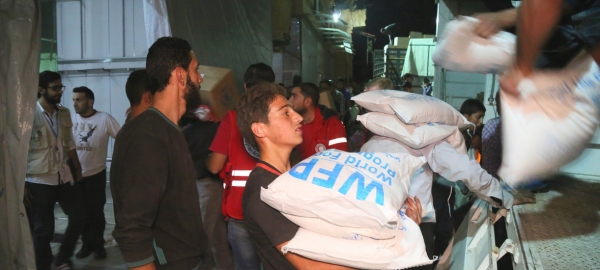Idlib, the capital of the northwestern Idlib province in Syria, is the last stronghold of resistance against the Syrian government. The province has been a destination for civilians fleeing violence in other regions of the country and approximately half of the 3 million people living in Idlib are internally displaced persons. Currently, Idlib is the one of the last regions in Syria still covered by the most recent internationally agreed-upon ceasefire.
Since 2011, tens of thousands of foreign fighters have entered Syria, and Idlib has become a base for these groups. These foreign fighters are mostly members of Hayat Tahrir ash-Sham, more commonly known as al-Qaeda in Syria, and Jabhat an-Nusra, another fundamentalist Islamist militia.
Civilians in the areas under the control of these groups, especially civilians of religious and ethnic minority (Shi’a, Druze, and Christians, among others), have been victims of coordinated violence at the hands of these militias.
In campaigns to drive the militia groups from Syria, the government has also been responsible for civilian casualties. A new offensive in Idlib would no doubt come with heavy losses. “Two of the main guarantors [of ceasefire negotiations] – in this case Turkey and the Russian Federation – are trying and we hope will succeed, in avoiding the worst-case scenario,” said UN Special Envoy to Syria Steffan de Mistura.
Part of the UN plan is negotiating the withdrawal of al-Qaeda fighters from the city of Idlib in order to reduce civilian casualties in any renewed fighting. Turkey, one of the three guarantors of the Astana Peace Talks, along with Iran and Russia, still has the capacity to communicate with the militia groups in Idlib.
The special envoy also stated that “no-one questions the Syrian government’s right to fight UN-identified terrorists, nor its right to recover ‘all of its territorial integrity.” The question of how to remove these foreign fighters remains. A renewed offensive would come at a high human cost in a conflict already deep into its seventh year. However, a permanent al-Qaeda presence in Syria is untenable for the Syrian government, the Syrian people, and regional stability.
To know more, please read:
http://www.atimes.com/theres-at-least-one-more-ugly-battle-brewing-in-syria//
https://news.un.org/en/story/2018/08/1018042
https://www.timesofisrael.com/un-envoy-proposes-rebel-pullback-from-syrias-idlib/
https://www.almasdarnews.com/article/syrian-army-has-no-offensive-planned-for-idlib-city/
https://www.reuters.com/article/us-mideast-crisis-syria-turkey/turkey-is-working-to-reach-ceasefire-in-syrias-idlib-foreign-minister-idUSKCN1LU0YK
By Jasper Saah
Editing Andrew Smith







